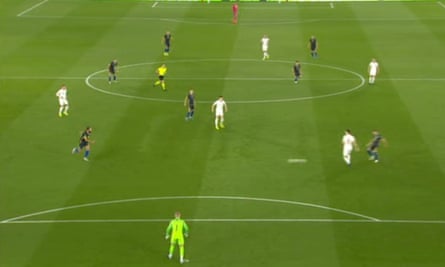When Gareth Southgate sat down to meet the media in the Terry Paine lounge at St Mary’s on Tuesday night, the topic in hand was human error.
Such a debate would normally offer great insight for all of us, given our proclivity for mistakes in the most unexpected (and expected) of circumstances. But this was specifically to do with the errors of human footballers, and the very best footballers at that, so the learnings for mere mortals were limited. However much you might wish to put yourself in Declan Rice’s shoes, in a very real sense, you could not.
To be fair, Southgate was struggling to make sense of things too. Kosovo had scored their first goal, in the first minute of the match, when a one-touch passing triangle went horribly wrong and Michael Keane played the ball blind into the hulking form of Kosovo’s Vedat Muriqi. The second error to result in a goal came just after half-time and belonged to Rice. This one was even worse, with the West Ham midfielder passing the ball to his opponent while looking straight at him.
Southgate suggested the glitches could have been due to pressure or to the intensity of the game. Certainly Kosovo had been talked up before the match as being more challenging opponents than England’s usual qualifying fare and this assessment wasn’t too far off. The visitors also set about the match eagerly and after half-time, desperate to restore some integrity with the score at 5-1, the intensity was increased. The Kosovans scored all three of their goals during these two periods and, so, the explanations were plausible. Southgate said he would take a little more time to make his mind up about what happened but, either way, it was “concerning”.
Just how concerning is that? Again, without a device that can wriggle inside his brain, we will struggle to know what Southgate really thinks. But you can say with confidence that the mistakes were concerning because they not only took off the gloss, but also a layer of undercoat from an otherwise Sterling performance (pun very much intended). England tore through the Kosovans with quick, vertical football and a world-class player (that’s Raheem again) directing the play. To see shoddy behaviour at the other end, and behaviour that was duly punished, harshed the buzz of many in the ground.

On the other hand, it is not as if England were ever really in danger of doing anything other than winning the game comfortably. They were so far ahead at half-time that keeping the same levels of concentration would have been difficult however hard they tried. And despite the two quick goals after the restart, England soon regained the balance of play and the initiative. They missed a penalty, hit the woodwork and failed to take other decent chances. They should surely have had more goals, though when the total is five already, that’s not much of a topic for complaint.
Another reason not to worry so much is that the most apocalyptic reading of events – make those mistakes against the best opposition and the game would be over – doesn’t really translate too well. Yes, England might have been feeling pressure as Southgate suggested, but it was not the same pressure as they would face in, say, a European Championship semi-final against France. Far from it. In fact some of the pressure might come not from fear of defeat but from wishing to prove one’s superiority over the opposition, hence popping off those triangles as soon as the first whistle had blown. England’s psychological preparation and approach will be very different against the very best.
But on the other hand again … it’s not as if similar mistakes haven’t happened against the very best, and very recently. England’s collapse against the Netherlands in this summer’s Nations League happened thanks to two moments where confidence was misplaced, where displays of technical prowess backfired.
Looking back slightly further, it’s tempting to include the crucial edge Croatia’s Mario Mandzukic got over a dozing John Stones in the World Cup semi-final a year earlier, a moment where an England player thought everything was OK when it very much was not.
Rice performed well over the two qualifying matches, Keane less so. It’s a team game with collective responsibility but certain individual components are likely still to change as England close in on next year’s finals. The rest of the challenge falls to Southgate and his coaches, trying to strike that most difficult of balances between confidence and complacency, knowing that this is where the biggest opportunities can be seized or spurned. It may prove a task too tricky to complete but, if so, England fans can at least console themselves watching scintillating attacking play from a team wearing the Three Lions. This has not always been the case.
Comments (…)
Sign in or create your Guardian account to join the discussion